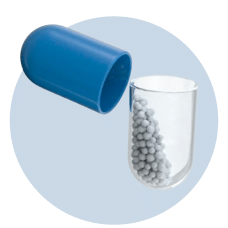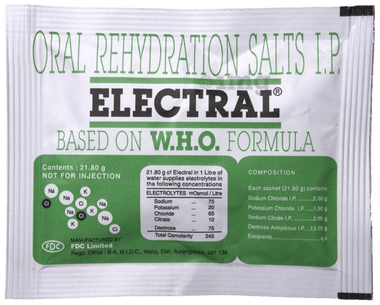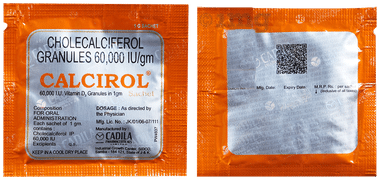Oregra Suspension
Your child’s medicine at a glance
Give Oregra Suspension to your child by mouth with or without food in the dose and way prescribed by the doctor. It may be prescribed alone or in combination with other medicines. The allergic symptoms may subside after your child has taken the initial few doses of Oregra Suspension. In case of serious allergic conditions, your child may have to continue taking the medicine for a week or two. If your child vomits within 30 minutes of taking this medicine, let the child calm down and give the same dose again. However, do not repeat the dose if it is already time for the next dose.
The intake of the medicine may cause some minor and temporary side effects like nausea, vomiting, dizziness, sleepiness, and headache. These side effects should ideally diminish on their own. But, in case they persist or start bothering your child, it would be best to consult your child’s doctor without any delay.
Inform your child’s doctor if your child is on any medical regime or is allergic to any medicine, product, or food. Make sure the doctor knows if your child has or had any heart, liver, kidney problems or was born prematurely. Any history regarding bowel obstruction, malnutrition, weight-related issues, and thyroid problems should also be well indicated to the doctor to avoid any complications in the treatment. Knowing the entire medical history will help your child’s doctor make dose alterations and plan your child’s overall treatment better.
Uses of Oregra Suspension in children
- Allergic conditions
- Nasal allergy symptoms
- Allergic skin conditions
- Allergic eye disease
- Sneezing and runny nose due to allergies
Side effects of Oregra Suspension in children
Common side effects of Oregra
- Dizziness
- Headache
- Drowsiness
- Nausea
How can I give Oregra Suspension to my child?
How Oregra Suspension works
Safety advice
However, consult your child's doctor before giving Oregra Suspension to your child in case of severe liver disease.
What if I forget to give Oregra Suspension to my child?
All substitutes
Quick tips
- Try giving the medicines at the same time each day, to help you remember.
- Your child may feel sleepy or dizzy after each dose of Oregra Suspension. If this happens, make your child sit or lie down and ask them to be careful while performing tasks that require mental focus.
- Avoid giving Oregra Suspension with fatty meals and fruit juice as both can reduce the absorption of the medicine.
- Oregra Suspension should be avoided in children who are less than 12 years of age as there is a risk of respiratory distress.
- Practice self-care tips:
- Abstain your child from coming in contact with allergens.
- Maintain a neat and clean ambiance around your child.
- Encourage your child to wear a face mask and avoid dusty places.
- Use of air conditioners instead of opening windows during the pollen season.
- Oregra Suspension may cause less sleepiness as a side effect compared to other similar medicines.
- Avoid drinking fruit juices (such as apple or orange) as this may affect the absorption of this medicine and cause more side effects.
- It may cause nausea. Stick to simple meals, and do not eat rich or spicy food.
- Avoid using antacids 30 minutes before or after taking this medicine. It can make it harder for your body to absorb this medicine.
- Never give the medicine to someone who seems to be suffering from a similar illness. This medicine should be taken only if prescribed by a doctor.
- Your doctor has prescribed Oregra Suspension to help relieve allergy symptoms such as itching, swelling and rashes.
- As compared to other similar medications, it is much less likely to make you feel sleepy.
- Be cautious while driving or doing anything that requires concentration as it can cause dizziness and sleepiness.
- Do not drink alcohol while taking this medication as it may cause increased sleepiness.
- Stop taking Oregra Suspension at least 3 days before taking an allergy test as it can affect the test results.
Fact Box
Interaction with drugs
Patient concerns
FAQs
What is Oregra Suspension used for?
Who should not take Oregra Suspension?
Can other medicines be given at the same time as Oregra Suspension?
Can I give Oregra Suspension along with juices?
How much Oregra Suspension should I give to my child?
My child is restless and unable to sleep properly at night. Can I give Oregra Suspension?
How should Oregra Suspension be stored?
What is Oregra Suspension used for?
What should I tell my doctor before starting treatment with Oregra Suspension?
What if I forget to take a dose of Oregra Suspension?
Who should not take Oregra Suspension?
Can I stop taking Oregra Suspension if I feel better?
Is Oregra Suspension an antibiotic?
Can Oregra Suspension cause dizziness?
Disclaimer:
Tata 1mg's sole intention is to ensure that its consumers get information that is expert-reviewed, accurate and trustworthy. However, the information contained herein should NOT be used as a substitute for the advice of a qualified physician. The information provided here is for informational purposes only. This may not cover everything about particular health conditions, lab tests, medicines, all possible side effects, drug interactions, warnings, alerts, etc. Please consult your doctor and discuss all your queries related to any disease or medicine. We intend to support, not replace, the doctor-patient relationship.References
- RA Skidgel. Histamine, Bradykinin, and Their Antagonists. In: Brunton LL, Hilal-Dandan R, Knollmann BC (Editors). Goodman & Gilman's: The Pharmacological Basis of Therapeutics. 13th ed. New York, New York: McGraw-Hill Medical; 2018. p. 718.
Marketer details
The list of available options shown with the same composition has been prepared upon the advice of registered medical practitioners, pharmacists affiliated with TATA 1MG. TATA 1MG does not promote any pharmaceutical product of any particular company, and all recommendations are based on the medical opinion, advisories from specialist medical and pharmaceutical professionals.
Lab tests offered by us
















